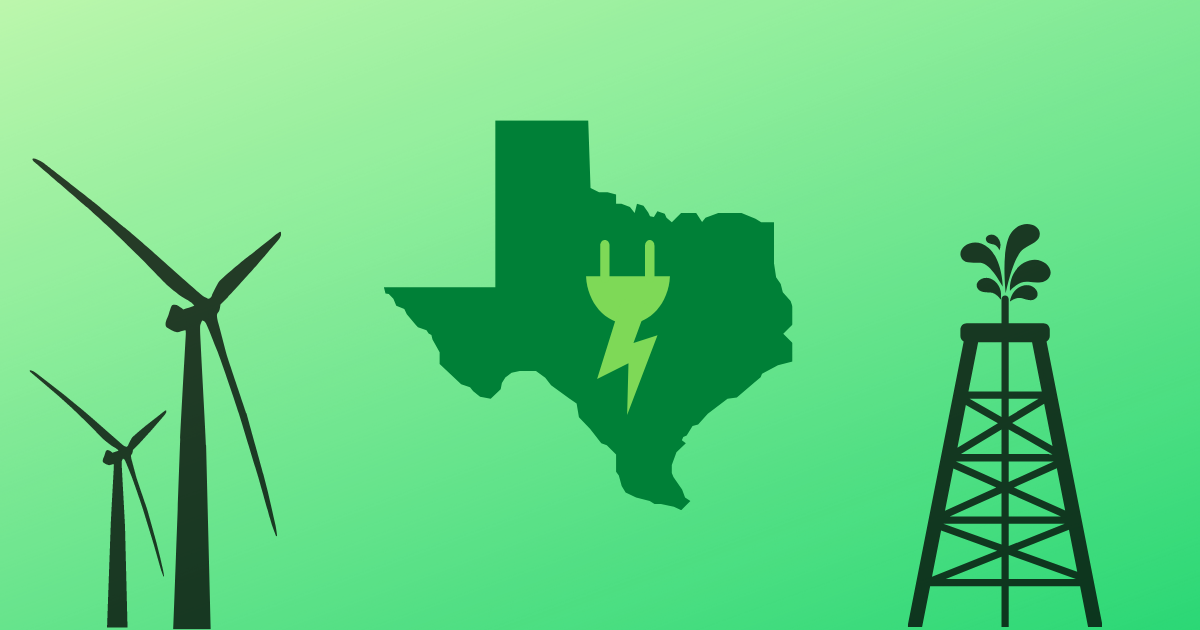On January 10, 1901, a well in Spindletop struck oil. A lot of oil. The black liquid spewed out at a rate of 100,000 barrels a day for nine days straight, the largest such gusher the world had ever seen up to that point. This marked the beginning of Texas’ days as an energy powerhouse, and oil and gas have been a major pillar of the Lone Star State’s economy ever since.
While oil and gas have been an economic boon for Texas, they come at an enormous cost to the planet. As the effects of climate change have become impossible to ignore, the world is trying to transition away from fossil fuels toward cleaner sources of energy. This energy transition creates challenges as well as opportunities for Texas.
“The energy transition is happening, it’s picking up speed,” said Ben Cahill, a senior fellow in the Energy Security and Climate Change Program at the Center for Strategic and International Studies. “Even in the oil and gas industry, it’s an inevitable fact.”
While the transition is already underway, there’s uncertainty about what this transition will look like and how long it will take. It could also get messy if not handled properly, as demonstrated by the ongoing energy crisis in Europe.
While renewables are already cheaper fossil fuels, a major disadvantage is that they are an intermittent energy source: the sun isn’t always shining and the wind isn’t always blowing. “A big challenge with moving away from fossil fuels is that we have to figure out stability and reliability of our energy systems as we electrify a lot more things and at the same time add many more intermittent sources,” Cahill told the Signal. “That’s an energy system design question, it’s a planning question, and it shows the complexity of phasing out fossil fuels.”
Completely replacing fossil fuels with renewables will require everything from cheap energy storage to better energy planning. This is not going to be a quick or easy switch, with Cahill calling it a “generational challenge.”
Nonetheless, the industry is moving forward. Concerns about the future viability of fossil fuels are causing investors to demand oil and gas companies have long-term plans for the transition and that’s had a big impact on their actions. “I’ve been an energy analyst for about 15 years and it’s really striking how much the concerns about the energy transition have really started to drive corporate behavior and it’s really encouraging,” said Cahill. “In the old days, if it was beyond a ten-year horizon companies couldn’t really plan for it, they couldn’t see it, it didn’t really affect their behavior. Those days are gone; in order to access capital and maintain public confidence companies need viable business plans and they’re really starting to push forward.”
So what does this mean for Texas? While a post-fossil fuel world might sound bad for a state where oil and gas is such a big economic driver, Texas is still well-positioned to take advantage of future developments. “As the transition unfolds in the next ten years and beyond Texas really stands to benefit from a lot of this and I think sometimes people wrongly see Texas as just an oil and gas state,” said Cahill. “There are a lot of reasons to think that Texas can really benefit from becoming an energy provider in all kinds of areas.”
Indeed, Texas is already the number one state in wind power and is also a major producer of solar power. The overall energy ecosystem that exists in Texas, including the talent pool and financial institutions could allow it to continue to be a leader in energy even as the world moves away from fossil fuels.
Even with the rise of renewables, oil and gas will still be around for quite some time. However, there are things the industry can do to lessen the environmental impact of fossil fuels while the transition is underway, such as reducing methane emissions. Cahill said that there are “easy, cost-efficient solutions” to reduce methane emissions in the oil and gas industry, although he added that Texas regulators have not done enough in this regard. “The Texas Railroad Commission and the Texas Commission on Environmental Quality have done a really poor job on putting good effective regulations on methane emissions and that is a shame.”
While Spindletop was a dramatic event that signaled the start of the Texas oil boom, the energy transition is proving to be more of a gradual process. There will be no single watershed moment that will usher in a new era of clean energy, but there is still a lot of important work being done in the industry to make it happen. Regardless of how we get there or when it happens, the future still looks bright for Texas energy.
William serves as the Washington Correspondent for the Texas Signal, where he primarily writes about Congress and other federal issues that affect Texas. A graduate of Colorado College, William has worked on Democratic campaigns in Texas, Colorado, and North Carolina. He is an internet meme expert.





